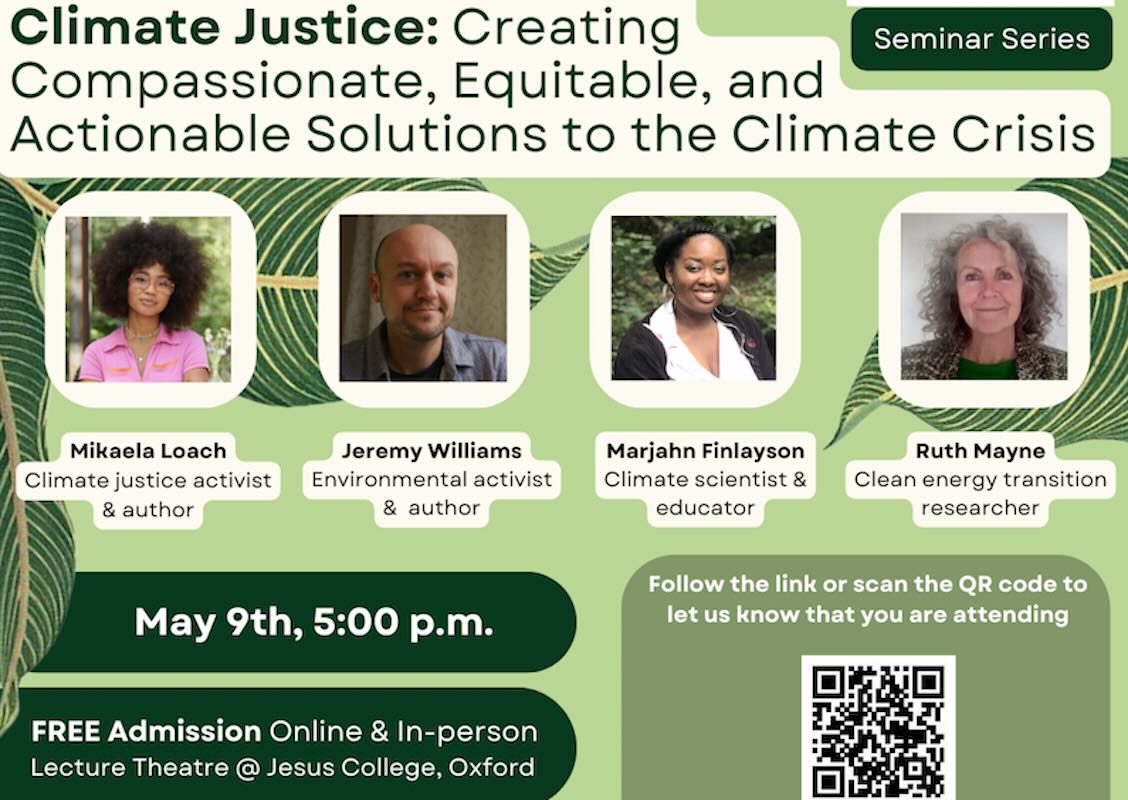Climate Justice: Creating Compassionate, Equitable, and Actionable Solutions to the Climate Crisis

Join us for a dynamic and thought-provoking panel discussion as we delve into the urgent issue of climate justice and explore pathways towards compassionate, equitable, and actionable solutions to the climate crisis.
Our panelists, comprised from a mix of backgrounds in academia, activism, and community leadership, will engage in a comprehensive dialogue aimed at fostering understanding, empathy, and collaboration in addressing the interconnected challenges of environmental sustainability and social justice. Through insightful reflections, real-world experiences, and innovative strategies, we will explore the intersectionality of climate justice, acknowledging the intricate links between race, class, gender, and environmental degradation.
The scope of this discussion will cover examining the impacts of climate change on vulnerable populations, particularly those in small island developing states (SIDS), to advocating for inclusive policies and grassroots initiatives. Together, we hope to encourage dialogue where compassion, equity, and action serve as guiding principles in our collective efforts to safeguard our planet and ensure a sustainable future for all. Join us as we embark on this transformative journey towards climate justice.
This event is part of the NERC DTP’s Grand Challenges Seminar Series running every Thursday at Jesus College from April 25th – June 13th.
Register here.
Panelist Bios
Mikaela Loach is the best-selling author of It’s Not That Radical: Climate Action To Transform Our World, a climate justice organiser, co-host of The YIKES Podcast and former medical student based in Brighton. In 2021, she was one of three claimants on the “Paid To Pollute” case who took the UK government to court over the huge public payments they give to fossil fuel companies every year. Her work focuses on the intersections of the climate crisis with oppressive systems and making the climate movement a more accessible space.
Jeremy Williams is a writer and campaigner for environmental and social justice, and the author of Climate Change is Racist: Race, Privilege and the Struggle for Climate Justice. He works as a climate action advisor to schools, writes the sustainability blog The Earthbound Report, and has a sideline as a children’s author. An activist with many interests, Jeremy is a founder of the Post-Growth Institute, Sustainable St Albans, Zero Carbon Luton, and a community energy trust that’s so new it doesn’t have a name yet. He grew up in Madagascar and Kenya and now lives in Luton.
Marjahn Finlayson is a Bahamian climate change specialist, educator, and activist. Through her platform, ClimateEdu Bahamas, she runs the local climate impact service, the Fin Forecast, and the social sustainability collective, DAPS (Development. Advancement. Preservation. Sustainability). As an activist, Marjahn brings concerns about SIDS and underserved communities to work more toward radical climate justice. As a PhD Candidate at the University of Bologna, she is affiliated with the Italian National Institute of Geophysics and Volcanology and researches oceanography and climate change.
Ruth Mayne is currently lead researcher at Oxfam Great Britain on Just Energy Transitions. She has worked in the voluntary sector, academic and consultant as a policy adviser, researcher, advocate and practitioner on social, climate and economic justice issues for many years. She is also active in her local community and was co-founder of Low Carbon West Oxford, an award-winning charity, and of West Oxford Community Renewables, an energy cooperative for the benefit of the community and a local councilor. She has published widely.
Register here.




